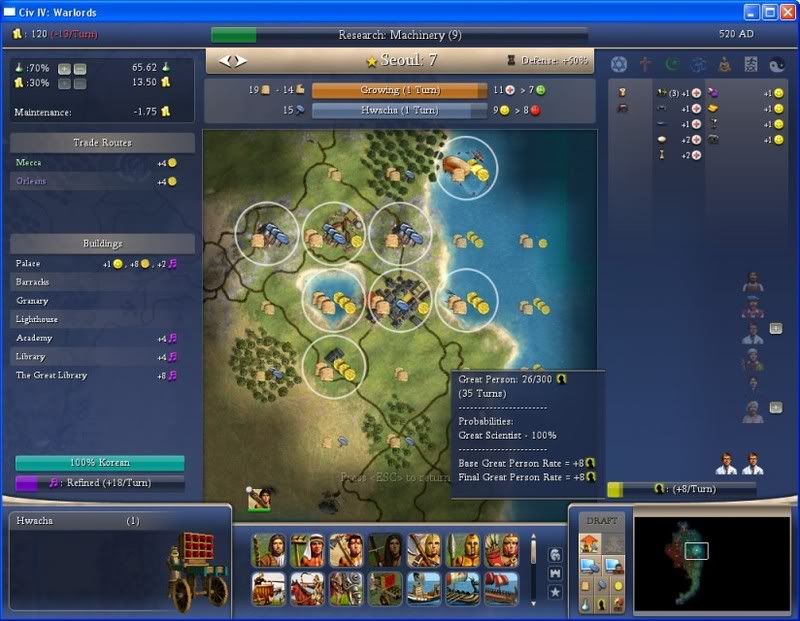Thanks for the interesting analysis of the State Property civic, Roland.

Are you certain that rush buying is so good though? Realistically, it is not as if you can put every gold piece earned by your towns towards rush buying buildings throughout your entire empire. A lot of it will have to go towards your research, or else you will fall behind. Some will also have to go towards your treasury, to prevent your civ from going into debt. If you are planning on a cultural victory, some may also need to go towards producing culture. Is the amount of gold that is left over after all of those portions have been taken out of it
really worth more than the hammers one could get from a mined (rather than a cottaged) hill, for instance?
Yes, I really think that rush buying is so good. Or to be more precise, I think that by building (free speech and universal suffrage enhanced) towns instead of (state property enhanced) workshops (or mines or lumbermills), you can have more hammers invested in construction while still maintaining the same rate of research. The reason is that the commerce from the additional towns (which replace workshops) can be fully converted into gold which is used for rush buying while the old towns can provide the old level of research.
People often like an example as it better shows the line of thought.
I'll compare two versions of the same city, one with more workshops, one with more towns. I'll assume that the state property civic is used to enhance the workshops and the free speech and universal suffrage civics are used to enhance towns. I'll assume that the production bonus and the gold bonus in the city are equal so that the 3 to 1 conversion of gold into hammers is correct. I'll only consider the extra production and commerce added by the tile improvements as the basic terrain is the same in both cases.
City version 1: 10 workshops, 10 towns, 70% science rate, 30% tax rate:
10*3 + 10*1 = 40 base hammers (to be enhanced by buildings)
10*7 = 70 commerce, 49 base science (to be enhanced by buidlings), 21 base gold (to be enhanced by buildings)
(7 towns are used for research, 3 for gold)
City version 2: 6 workshops, 14 towns, 50% science rate, 50% tax rate:
6*3 + 14*1 = 32 base hammers (to be enhanced by buildings)
14*7=98 commerce, 49 base science (to be enhanced by buildings), 49 base gold to be enhanced by buildings)
(7 towns are used for research, 7 for gold)
City version 2 has 28 extra gold which can be used to rush buy 9.3 hammers. City version 2 has 8 less hammers. So a net bonus of 1.3 hammers
Note that the extra 4 towns are purely used for gold rushing by setting the science-tax rate at the right level.
Additional benefits of gold rushing:
-usually when gold rushing becomes available, you have a bigger bonus on gold than on hammers because the gold enhancing buildings are available earlier in the game than the hammer enhancing buildings. This means that gold rushing becomes more efficient.
-gold rushing can be used anywhere you want to, not only in the city where the gold is produced. Hammer building can only be used in the city where the hammers are produced. This benefit is huge. It greatly enhances your flexibility allowing you to help a certain city a lot or just spreading around the gold rushing.
-You don't have to use the extra commerce from additional towns for gold rushing. You can use it for extra research speed if you don't need the production. Or you can use is for spy actions. Again commerce can be applied to far more things than hammers, increasing your flexibilty.
-You can finish something when you want to. Gold rushing a defender can be great. Winning a border cultural war by gold rushing some cultural buildings. Adding that library to that sea city that has great commerce but low production. Winning that wonder race while your opponent was miles ahead of you in producing it. The possibilities are limitless.
-Financial trait improves the power of towns and thus of gold rushing.
Limitations to gold rushing:
-Space ship components cannot be gold rushed.
-Rushing of World wonders and small wonders is more expensive. The conversion factor is not 3 to 1 for these buildings (it varies between various wonders).
-Rush building something which doesn't have any hammers already invested in it (in the first turn of construction) costs 50% more. Don't do that.
-Not all cottages are towns (allthough emancipation speeds up the growth) and if towns are destroyed you can't rebuild them quickly. Workshops, mines and lumbermills are quickly rebuild.
-Some cities have a production bonus that is higher than 100% which is typically the maximum gold bonus (exception Wall Street). It's not so efficient to gold rush in cities with the Ironworks or the Heroic Epic. This also applies to some buildings that get production bonusses due to your traits or the availability of special resources (stone, marble, etc.)
The Kremlin removes any thought process about the question whether to rush or not.

Conclusion: In a well developed economy, gold rushing is very powerful if applied in the right circumstances. In optimal situations it gives more production than traditional building methods and it greatly improves the flexibility of your economy. There are certain situations where it is inefficient to use it. The Kremlin makes gold rushing overpowered. Luckily the wonder is obsolete fast.





 ), production (
), production (  ) and commerce (
) and commerce (  ), managing specialists, managing happiness and sickness and managing great people production, to name just a few.
), managing specialists, managing happiness and sickness and managing great people production, to name just a few. 
